About the Dyer Institute
Contact Us
- Brittain Hall 113
125 Chanticleer Drive West
P.O. Box 261954
Conway, SC 29528-6054 - 843-349-6952
- dyerinstitute@coastal.edu
- Download Dyer Institute Brochure »
Our Mission
To engage students in active learning opportunities while creating public value, untangling public problems, and finding public solutions that have positive and measurable impacts.
Our Vision
That individuals across the community, state, and nation can improve governance and solve big problems by working together on a basis of mutual knowledge and understanding.
Our Goals
- To produce and disseminate quality, nonpartisan consultation work across multiple public policy areas.
- To equip Coastal Carolina University students with leadership, research, and analysis skills and provide them with an outlet to investigate important questions about governance and policy.
- To communicate with public servants and citizens about policy issues, alternatives, and preferences.
About Edgar "Eddie" Dyer
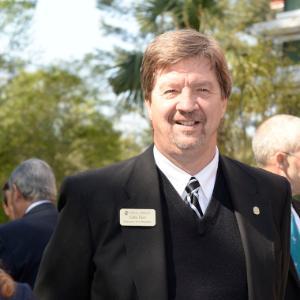 Eddie Dyer is the former executive vice president and chief operating officer at Coastal Carolina University. He retired in 2015 after serving as a member of the political science faculty since 1976. During his tenure, he also served in a variety of administrative positions at the institution, including chair of the Department of Politics, dean of the Thomas W. and Robin W. Edwards College of Humanities and Fine Arts, vice president of university relations, university counsel, executive director of the Coastal Educational Foundation, and a stint as interim director of athletics as CCU prepared to add football as a sport.
Eddie Dyer is the former executive vice president and chief operating officer at Coastal Carolina University. He retired in 2015 after serving as a member of the political science faculty since 1976. During his tenure, he also served in a variety of administrative positions at the institution, including chair of the Department of Politics, dean of the Thomas W. and Robin W. Edwards College of Humanities and Fine Arts, vice president of university relations, university counsel, executive director of the Coastal Educational Foundation, and a stint as interim director of athletics as CCU prepared to add football as a sport.
He was the first recipient of the HTC Distinguished Teacher-Scholar Lecturer Award and has also received the Distinguished Teaching Award and the Student Development Award; he was inducted into the local chapter of Omicron Delta Kappa and is an honorary inductee of the CCU Athletic Hall of Fame. A member of the Horry County Planning Commission and the board of directors for United Way, he was also appointed to chair the county’s Ride III Committee. He has served on the boards of a number of community groups for better local government, youth sports, medical care for the indigent and other charitable initiatives.
His wife, Cynthia, is a writer and retired United Methodist minister. Their two grown children, Hilary and Emerson, attended public school in Horry County. Emerson is a writer and content manager, having received his baccalaureate degree and master’s degree in writing from CCU. Hilary is an administrator in the admissions office at the University of South Carolina, having earned bachelor's and master's degrees in integrated marketing from that institution.
Affiliated Faculty Profiles
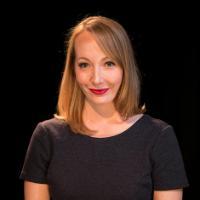 Jacqueline Kurlowski is the director of the Edgar Dyer Institute for Leadership and Public Policy and holds a Master of Public Affairs in public policy from the University of Missouri, a Bachelor of Science in business administration and a Bachelor of Arts in Spanish. With more than 10 years of experience in the public sector, Kurlowski brings analytical skills and project management expertise to the Dyer Institute, where she organizes and directs the institute’s Policy Analysis and Consulting and Data Analytics initiatives. Kurlowski provides grant management, grant writing, data analysis and needs assessments, and program evaluation to nonprofits, local governmental agencies, the county and region. Kurlowski founded the Dyer Fellowship program for Coastal Carolina University students, which connects academic theory to practice, fosters experiential learning opportunities, and equips students with tools to be active learners and critical thinkers. Before joining the Dyer Institute, Kurlowski served as a consultant and analyst for the University of Missouri. She has also worked on Capitol Hill, taught high school Spanish, and managed a medical clinic in the Dominican Republic.
Jacqueline Kurlowski is the director of the Edgar Dyer Institute for Leadership and Public Policy and holds a Master of Public Affairs in public policy from the University of Missouri, a Bachelor of Science in business administration and a Bachelor of Arts in Spanish. With more than 10 years of experience in the public sector, Kurlowski brings analytical skills and project management expertise to the Dyer Institute, where she organizes and directs the institute’s Policy Analysis and Consulting and Data Analytics initiatives. Kurlowski provides grant management, grant writing, data analysis and needs assessments, and program evaluation to nonprofits, local governmental agencies, the county and region. Kurlowski founded the Dyer Fellowship program for Coastal Carolina University students, which connects academic theory to practice, fosters experiential learning opportunities, and equips students with tools to be active learners and critical thinkers. Before joining the Dyer Institute, Kurlowski served as a consultant and analyst for the University of Missouri. She has also worked on Capitol Hill, taught high school Spanish, and managed a medical clinic in the Dominican Republic.
Contact: Jamkurlow@coastal.edu or 843-349-6952.
Daniel C. Abel is a professor of marine science at Coastal Carolina University in Conway, S.C. He earned his M.Sc. in 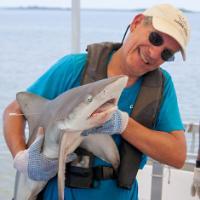 marine biology from the College of Charleston and his Ph.D. in marine biology from the University of California San Diego’s Scripps Institution of Oceanography, and was a postdoctoral fellow in marine biomedicine at the Medical University of South Carolina. His research focuses on the physiology and ecology of sharks and rays. He is co-author of the textbooks Environmental Issues: Looking Towards a Sustainable Future (4th ed, Pearson.), Environmental Oceanography (Jones and Bartlett), and Environmental Geology (Jones and Bartlett). He has been an award-winning environmental columnist, was founding director of CCU’s Sustainability Initiative from 2006–2012, and served on the board of directors of the Dogwood Alliance, a forest protection organization. He has significant international teaching experience, which includes his annual Biology of Sharks course held at the Bimini Biological Field Station in the Bahamas for the last 19 years. He taught at sea and in over 30 countries (including dissections of sharks on the streets of Casablanca, Morocco) on the M/V Explorer with Semester at Sea in spring 2010 and summer 2012, 2013, and 2014. Dr. Abel is a Senior Fellow of the U.S. Partnership for Education for Sustainable Development. He resides in Pawleys Island, S.C. Abel served as a Dyer Fellow faculty mentor in 2017.
marine biology from the College of Charleston and his Ph.D. in marine biology from the University of California San Diego’s Scripps Institution of Oceanography, and was a postdoctoral fellow in marine biomedicine at the Medical University of South Carolina. His research focuses on the physiology and ecology of sharks and rays. He is co-author of the textbooks Environmental Issues: Looking Towards a Sustainable Future (4th ed, Pearson.), Environmental Oceanography (Jones and Bartlett), and Environmental Geology (Jones and Bartlett). He has been an award-winning environmental columnist, was founding director of CCU’s Sustainability Initiative from 2006–2012, and served on the board of directors of the Dogwood Alliance, a forest protection organization. He has significant international teaching experience, which includes his annual Biology of Sharks course held at the Bimini Biological Field Station in the Bahamas for the last 19 years. He taught at sea and in over 30 countries (including dissections of sharks on the streets of Casablanca, Morocco) on the M/V Explorer with Semester at Sea in spring 2010 and summer 2012, 2013, and 2014. Dr. Abel is a Senior Fellow of the U.S. Partnership for Education for Sustainable Development. He resides in Pawleys Island, S.C. Abel served as a Dyer Fellow faculty mentor in 2017.
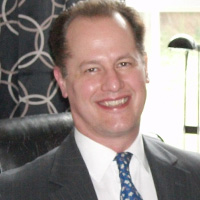 Jonathan M. Acuff has a Ph.D. in political science from the University of Washington, two Master of Arts degrees in political science from UW and the University of Iowa, a M.A. Ed. (social studies) from the College of William and Mary, and a B.A. in history from the College of William and Mary. He has been elected three times to the Executive Committee of the Ethnicity, Nationalism, and Migration (ENMISA) organized section of the International Studies Association. His research and teaching interests include international security, intelligence analysis, strategy, military doctrine, revolutions and state failure, and social theory. He is the author of numerous peer-reviewed journal articles and book chapters and is the editor of Theory and Application of the “Generation” in International Relations and Politics (Palgrave, 2012). Before joining the faculty at Coastal, he worked as a military analyst for the National Bureau of Asian Research in Seattle, WA and served as an officer in the US Army Reserve. Acuff is a former Ford Foundation Crossing Borders Fellow and the 2006 winner of ISA’s Martin O. Heisler Award. Acuff served as a Dyer Fellow faculty mentor in 2018.
Jonathan M. Acuff has a Ph.D. in political science from the University of Washington, two Master of Arts degrees in political science from UW and the University of Iowa, a M.A. Ed. (social studies) from the College of William and Mary, and a B.A. in history from the College of William and Mary. He has been elected three times to the Executive Committee of the Ethnicity, Nationalism, and Migration (ENMISA) organized section of the International Studies Association. His research and teaching interests include international security, intelligence analysis, strategy, military doctrine, revolutions and state failure, and social theory. He is the author of numerous peer-reviewed journal articles and book chapters and is the editor of Theory and Application of the “Generation” in International Relations and Politics (Palgrave, 2012). Before joining the faculty at Coastal, he worked as a military analyst for the National Bureau of Asian Research in Seattle, WA and served as an officer in the US Army Reserve. Acuff is a former Ford Foundation Crossing Borders Fellow and the 2006 winner of ISA’s Martin O. Heisler Award. Acuff served as a Dyer Fellow faculty mentor in 2018.
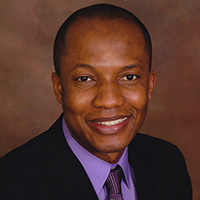 Richard Aidoo is a professor in the Department of Political Science at Coastal Carolina University. He also serves as an assistant dean for the Edwards College of Humanities and Fine Arts and as an adviser for the global studies minor. He holds a Ph.D. in political science (international relations and comparative politics) from Miami University (Ohio). Aidoo’s research focuses on economic development issues in Africa and the developing world. He has particular expertise in Chinese economic diplomacy in Africa and other parts of the global south. He wants students to venture out of their comfort zones and research and study policy issues that pertain to the politics and economics of various regions in a vast and hyper-globalized world. Aidoo served as a Dyer Fellow faculty mentor in 2016.
Richard Aidoo is a professor in the Department of Political Science at Coastal Carolina University. He also serves as an assistant dean for the Edwards College of Humanities and Fine Arts and as an adviser for the global studies minor. He holds a Ph.D. in political science (international relations and comparative politics) from Miami University (Ohio). Aidoo’s research focuses on economic development issues in Africa and the developing world. He has particular expertise in Chinese economic diplomacy in Africa and other parts of the global south. He wants students to venture out of their comfort zones and research and study policy issues that pertain to the politics and economics of various regions in a vast and hyper-globalized world. Aidoo served as a Dyer Fellow faculty mentor in 2016.
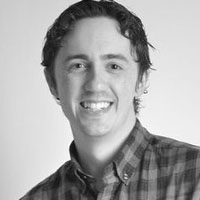 Adam Chamberlain is a professor in the Department of Political Science at Coastal Carolina University, where he serves as the chair of the department as well as the editor of the Journal of Political Science. His research and teaching interests include political organizations (political parties and interest groups), public opinion and political history in the United States. He is originally from Otto, New York, but has lived in the Carolinas for 11 years, having earned his M.A. and Ph.D. from the University of North Carolina at Chapel Hill. Chamberlain served as a Dyer Fellow faculty mentor in 2016, 2018, and 2019.
Adam Chamberlain is a professor in the Department of Political Science at Coastal Carolina University, where he serves as the chair of the department as well as the editor of the Journal of Political Science. His research and teaching interests include political organizations (political parties and interest groups), public opinion and political history in the United States. He is originally from Otto, New York, but has lived in the Carolinas for 11 years, having earned his M.A. and Ph.D. from the University of North Carolina at Chapel Hill. Chamberlain served as a Dyer Fellow faculty mentor in 2016, 2018, and 2019.
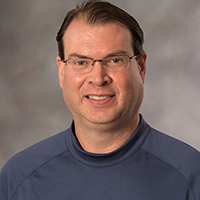 Michael S. Dunn is a professor in the Department of Health Sciences, joining the Coastal Carolina University faculty in 2011. He earned his Ph.D. in health education/health promotion from The University of Alabama. Dunn’s research focuses on adolescent and young adult health risk behaviors. He has published over 25 peer-reviewed publications and over 45 presentations at the national and international level. The journals of publication have included the American Journal of Sexuality Education, Psychological Reports, Journal of School Health, Journal of Drug and Alcohol Education, and the American Journal of Health Studies and his presentations have been mainly at the American Public Health Association annual meeting, which is the premiere public health organization. Dunn is the co-advisor, as well as a member of Eta Sigma Gamma, the national health professional honorary society, as well as a member of Delta Omega, the national public health honorary. Dunn served as a Dyer Fellow faculty mentor in 2018.
Michael S. Dunn is a professor in the Department of Health Sciences, joining the Coastal Carolina University faculty in 2011. He earned his Ph.D. in health education/health promotion from The University of Alabama. Dunn’s research focuses on adolescent and young adult health risk behaviors. He has published over 25 peer-reviewed publications and over 45 presentations at the national and international level. The journals of publication have included the American Journal of Sexuality Education, Psychological Reports, Journal of School Health, Journal of Drug and Alcohol Education, and the American Journal of Health Studies and his presentations have been mainly at the American Public Health Association annual meeting, which is the premiere public health organization. Dunn is the co-advisor, as well as a member of Eta Sigma Gamma, the national health professional honorary society, as well as a member of Delta Omega, the national public health honorary. Dunn served as a Dyer Fellow faculty mentor in 2018.
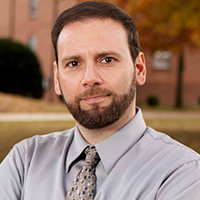 Joseph Fitsanakis, Ph.D., specializes in intelligence and national security. He has taught and written extensively on intelligence policy and practice, intelligence collection, information security, communications interception, cyber espionage, and transnational criminal networks. His writings have been translated into several languages and referenced by media outlets such as the Washington Post, BBC, ABC, NPR, Newsweek, the Diplomat, Le Monde and Wired. Before joining Coastal Carolina University, Fitsanakis built the Security and Intelligence Studies program at King University, where he also directed the King Institute for Security and Intelligence Studies. Since coming to Coastal in 2015, he has received the University-wide Distinguished Professor of the Year Award, the Edward College John B. Durrell Award, and the Department of Politics Professor of the Year Award (twice). Fitsanakis is also deputy director of the European Intelligence Academy and senior editor at intelNews.org, an ACI-indexed scholarly blog that is cataloged through the United States Library of Congress. Fitsanakis was a Dyer Fellow faculty mentor in 2019 and 2020.
Joseph Fitsanakis, Ph.D., specializes in intelligence and national security. He has taught and written extensively on intelligence policy and practice, intelligence collection, information security, communications interception, cyber espionage, and transnational criminal networks. His writings have been translated into several languages and referenced by media outlets such as the Washington Post, BBC, ABC, NPR, Newsweek, the Diplomat, Le Monde and Wired. Before joining Coastal Carolina University, Fitsanakis built the Security and Intelligence Studies program at King University, where he also directed the King Institute for Security and Intelligence Studies. Since coming to Coastal in 2015, he has received the University-wide Distinguished Professor of the Year Award, the Edward College John B. Durrell Award, and the Department of Politics Professor of the Year Award (twice). Fitsanakis is also deputy director of the European Intelligence Academy and senior editor at intelNews.org, an ACI-indexed scholarly blog that is cataloged through the United States Library of Congress. Fitsanakis was a Dyer Fellow faculty mentor in 2019 and 2020.
Tiffany Hollis, Ph.D., is an associate professor in the Spadoni College of Education and Social Sciences at Coastal Carolina University. She has a clear and strong commitment to diversity, equity, and social justice with more than 14 years in the education setting as a social justice educator. Hollis’ research interests focus on the areas of relationship-based and culturally responsive classroom management skills; trauma-informed education; social emotional learning skills; and preventing teacher burnout among teachers in various classroom contexts, particularly in settings with students who exhibit challenging or difficult behaviors. Hollis’ research also examines mental health support in the education setting. Hollis served as a Dyer Fellow faculty mentor in 2020.
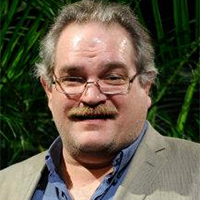 Robert B. Jenkot is an associate professor and chair of the department of sociology and criminal justice. He earned his doctorate in sociology at Southern Illinois University-Carbondale. His research leans heavily on the intersection of race, class and gender as they interact with criminal and deviant behavior. He is also keenly interested in the way that criminals and deviants overcome the moral and ethical boundaries learned through socialization in order to take part in non-conforming behavior. In particular, how these factors influence a person’s illicit drug use, sales and manufacturing. Jenkot served as a Dyer Fellow faculty mentor in 2019.
Robert B. Jenkot is an associate professor and chair of the department of sociology and criminal justice. He earned his doctorate in sociology at Southern Illinois University-Carbondale. His research leans heavily on the intersection of race, class and gender as they interact with criminal and deviant behavior. He is also keenly interested in the way that criminals and deviants overcome the moral and ethical boundaries learned through socialization in order to take part in non-conforming behavior. In particular, how these factors influence a person’s illicit drug use, sales and manufacturing. Jenkot served as a Dyer Fellow faculty mentor in 2019.
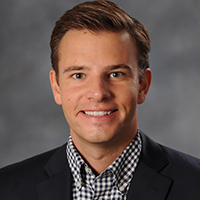 Drew Kurlowski joined the Coastal Carolina University faculty in 2015, having earned his M.A. in government from the University of Virginia and his Ph.D. from the University of Missouri. He was previously the senior research fellow at a D.C. polling firm. His research interests include American campaigns and elections, election law, party organizations, political behavior and public opinion. Drew is a frequent contributor to local television media outlets covering political matters from Conway to Washington, D.C., providing local, regional, and national election analysis. He also enjoys reaching out to the community, providing lectures to the OLLI program and talking with civic organizations and other groups in the Grand Strand area. Kurlowski is an integral part of the Dyer Fellowship program, organizing and conducting a fellowship workshop on survey design and polling. He provides one-on-one mentorship as the Fellows craft primary data collections tools. Kurlowski served as a Dyer Fellow faculty mentor in 2016, 2017, 2019, and 2020.
Drew Kurlowski joined the Coastal Carolina University faculty in 2015, having earned his M.A. in government from the University of Virginia and his Ph.D. from the University of Missouri. He was previously the senior research fellow at a D.C. polling firm. His research interests include American campaigns and elections, election law, party organizations, political behavior and public opinion. Drew is a frequent contributor to local television media outlets covering political matters from Conway to Washington, D.C., providing local, regional, and national election analysis. He also enjoys reaching out to the community, providing lectures to the OLLI program and talking with civic organizations and other groups in the Grand Strand area. Kurlowski is an integral part of the Dyer Fellowship program, organizing and conducting a fellowship workshop on survey design and polling. He provides one-on-one mentorship as the Fellows craft primary data collections tools. Kurlowski served as a Dyer Fellow faculty mentor in 2016, 2017, 2019, and 2020.
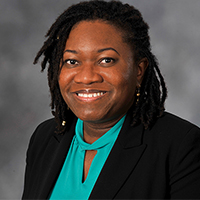 Fredanna M'Cormack McGough is the chair of the Department of Health Sciences and is a professor at Coastal Carolina University. Originally from Sierra Leone, McGough lived in Nigeria and Kenya before coming to the United States to pursue an undergraduate degree at the University of North Florida. McGough went on to complete both her master's and doctoral studies from Southern Illinois University Carbondale (SIUC) in Carbondale, Illinois. In the fall of 2008, McGough joined the faculty at Coastal Carolina University. McGough embodies the teacher-scholar model therefore; she incorporates her research and community work into the classroom. Her teaching responsibilities include human sexuality, women’s health, nutrition and global health perspectives. McGough’s research interests focus on addressing social injustices, tackling social inequities and exploring socio-ecological factors that affect health care access, sexual and reproductive health autonomy, and maternal health outcomes. McGough served as a Dyer Fellow faculty mentor in 2017.
Fredanna M'Cormack McGough is the chair of the Department of Health Sciences and is a professor at Coastal Carolina University. Originally from Sierra Leone, McGough lived in Nigeria and Kenya before coming to the United States to pursue an undergraduate degree at the University of North Florida. McGough went on to complete both her master's and doctoral studies from Southern Illinois University Carbondale (SIUC) in Carbondale, Illinois. In the fall of 2008, McGough joined the faculty at Coastal Carolina University. McGough embodies the teacher-scholar model therefore; she incorporates her research and community work into the classroom. Her teaching responsibilities include human sexuality, women’s health, nutrition and global health perspectives. McGough’s research interests focus on addressing social injustices, tackling social inequities and exploring socio-ecological factors that affect health care access, sexual and reproductive health autonomy, and maternal health outcomes. McGough served as a Dyer Fellow faculty mentor in 2017.
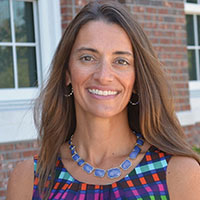 Pamela Martin is a professor of political science and international relations at Coastal Carolina University, where she teaches courses in international relations and environmental politics. Martin was awarded the University HTC Distinguished Teacher-Scholar Lecturer Award and was a Fulbright Scholar in Ecuador, focusing on environmental governance of the Amazon. Her books include Ending the Fossil Fuel Era, Oil in the Soil: The Politics of Paying to Preserve the Amazon and Introduction to World Politics: Conflict and Consensus on a Small Planet. Martin and her students are currently studying energy in South Carolina within a sustainable framework. Martin’s new research and publications focus on emerging norms and legal frameworks that grant rights to nature around the globe including Ecuador, India, New Zealand and the United States. Martin served as a Dyer Fellow faculty mentor in 2016, 2017 and 2018.
Pamela Martin is a professor of political science and international relations at Coastal Carolina University, where she teaches courses in international relations and environmental politics. Martin was awarded the University HTC Distinguished Teacher-Scholar Lecturer Award and was a Fulbright Scholar in Ecuador, focusing on environmental governance of the Amazon. Her books include Ending the Fossil Fuel Era, Oil in the Soil: The Politics of Paying to Preserve the Amazon and Introduction to World Politics: Conflict and Consensus on a Small Planet. Martin and her students are currently studying energy in South Carolina within a sustainable framework. Martin’s new research and publications focus on emerging norms and legal frameworks that grant rights to nature around the globe including Ecuador, India, New Zealand and the United States. Martin served as a Dyer Fellow faculty mentor in 2016, 2017 and 2018.
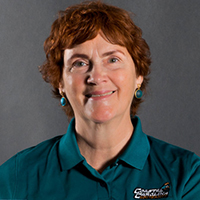 Maggi M. Morehouse is a Burroughs Distinguished Professor of History and Culture at Coastal Carolina University. In 2001, she completed her Ph.D. in African Diaspora Studies at the University of California, Berkeley. Today, she teaches courses on the history of the African Diaspora global diasporas and migrations, including the many locations of the Black Atlantic. She is affiliate faculty with the Joyner Institute for Gullah and African Diaspora Studies at CCU. Morehouse served as a Dyer Fellow faculty mentor in 2019.
Maggi M. Morehouse is a Burroughs Distinguished Professor of History and Culture at Coastal Carolina University. In 2001, she completed her Ph.D. in African Diaspora Studies at the University of California, Berkeley. Today, she teaches courses on the history of the African Diaspora global diasporas and migrations, including the many locations of the Black Atlantic. She is affiliate faculty with the Joyner Institute for Gullah and African Diaspora Studies at CCU. Morehouse served as a Dyer Fellow faculty mentor in 2019.
Gillian Richards-Greaves, Ph.D., is an associate professor of anthropology in the -200x200.jpg) Department of Anthropology and Geography at Coastal Carolina University. She earned dual Ph.Ds. in ethnomusicology and cultural anthropology from Indiana University, Bloomington, and a B.A. and M.A. in music education with minor in mathematics from Hunter College of the City University of New York (CUNY). Her research encompasses the musical, cultural, linguistic, and ritual expressions of the African Diaspora, with emphasis on the connections between Africa, the Caribbean, and the United States (Gullah-Geechee). Richards-Greaves served as a Dyer Fellow faculty mentor in 2020.
Department of Anthropology and Geography at Coastal Carolina University. She earned dual Ph.Ds. in ethnomusicology and cultural anthropology from Indiana University, Bloomington, and a B.A. and M.A. in music education with minor in mathematics from Hunter College of the City University of New York (CUNY). Her research encompasses the musical, cultural, linguistic, and ritual expressions of the African Diaspora, with emphasis on the connections between Africa, the Caribbean, and the United States (Gullah-Geechee). Richards-Greaves served as a Dyer Fellow faculty mentor in 2020.
Sherer W. Royce is an associate professor and joined the Coasta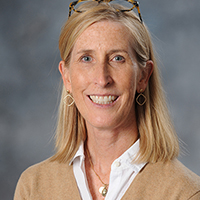 l Carolina University faculty in 2003. She earned a bachelor's degree in broadcast journalism from the University of South Carolina in 1982, a master's degree in public health and a doctorate degree in public health from the University of South Carolina in 1996 and 2004, respectively. Royce is a member of Delta Omega, the national public health honorary society and Eta Sigma Gamma, the national professional health honorary society. Her scholarship includes more than 20 peer-reviewed publications and refereed presentations at the local, state, national and international levels. She serves as the faculty advisor to the Health Promotion Club and is a member of the board of directors for the Grand Strand Rape Crisis Center and for BREATHE, an Horry County tobacco prevention coalition. Royce's research interests and expertise are in the areas of tobacco use prevention and tobacco policy, physical activity, teen pregnancy prevention, tuberculosis awareness, public health policy advocacy, community health and Photovoice, a research methodology that collects photographic data for community change. Royce served as a Dyer Fellow faculty mentor in 2017, 2018 and 2020.
l Carolina University faculty in 2003. She earned a bachelor's degree in broadcast journalism from the University of South Carolina in 1982, a master's degree in public health and a doctorate degree in public health from the University of South Carolina in 1996 and 2004, respectively. Royce is a member of Delta Omega, the national public health honorary society and Eta Sigma Gamma, the national professional health honorary society. Her scholarship includes more than 20 peer-reviewed publications and refereed presentations at the local, state, national and international levels. She serves as the faculty advisor to the Health Promotion Club and is a member of the board of directors for the Grand Strand Rape Crisis Center and for BREATHE, an Horry County tobacco prevention coalition. Royce's research interests and expertise are in the areas of tobacco use prevention and tobacco policy, physical activity, teen pregnancy prevention, tuberculosis awareness, public health policy advocacy, community health and Photovoice, a research methodology that collects photographic data for community change. Royce served as a Dyer Fellow faculty mentor in 2017, 2018 and 2020.
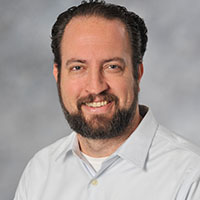 Jonathan Trerise joined the Department of Philosophy and Religious Studies in the Fall of 2010. His undergraduate degree in philosophy is from Cal State Fullerton, and his M.A. and Ph.D. are from the University of Missouri-Columbia, where he wrote a dissertation on the moral foundations of intellectual property rights under the supervision of Peter Vallentyne. He researches primarily on applied ethics and political philosophy. He is an associate professor of philosophy and religious studies at CCU. Trerise served as a Dyer Fellow faculty mentor in 2018.
Jonathan Trerise joined the Department of Philosophy and Religious Studies in the Fall of 2010. His undergraduate degree in philosophy is from Cal State Fullerton, and his M.A. and Ph.D. are from the University of Missouri-Columbia, where he wrote a dissertation on the moral foundations of intellectual property rights under the supervision of Peter Vallentyne. He researches primarily on applied ethics and political philosophy. He is an associate professor of philosophy and religious studies at CCU. Trerise served as a Dyer Fellow faculty mentor in 2018.
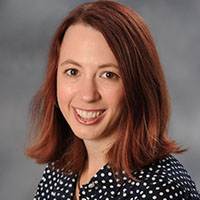 Misti Williams is a senior lecturer in the Department of Communication, Media, and Culture at Coastal Carolina University. She completed her Ph.D. in the fields of political communication and political science at the University of Washington, Seattle in 2010. Her teaching and research interests include strategic communication and political action, mass media and identity, persuasion and propaganda in international conflict, and news coverage of foreign policy. She has published work on the strategic use of global media by diasporas to mobilize on behalf of causes in the homeland. Williams served as a Dyer Fellow faculty mentor in 2018.
Misti Williams is a senior lecturer in the Department of Communication, Media, and Culture at Coastal Carolina University. She completed her Ph.D. in the fields of political communication and political science at the University of Washington, Seattle in 2010. Her teaching and research interests include strategic communication and political action, mass media and identity, persuasion and propaganda in international conflict, and news coverage of foreign policy. She has published work on the strategic use of global media by diasporas to mobilize on behalf of causes in the homeland. Williams served as a Dyer Fellow faculty mentor in 2018.


